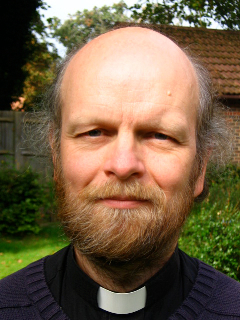Opinion Column

He comes as light in the darkness
Andy Bryant believes that it is the ordinariness of the events that surrounded the birth of Jesus two thousand years ago that bring us hope today.
It begins, of course, with angels. We would expect nothing less. Gabriel comes to visit Mary and in her “yes”, God’s great plan of salvation starts to take substance. An angel messenger underlines the unique significance of this moment. The presence of an angel affirms this as the greatest turning point in human history. All time will be measured as before or after this birth.
And we expect the events that follow will continue to reflect the fact that this is a special story. Only they do not. What is shocking around the birth of God’s son, the coming of the Messiah, is the sheer, terrifyingly, ordinariness of the unfolding events.
There is an issue of disputed paternity. Then the whim of a foreign ruler demands a census (not doubt to help raise taxes) which causes mass internal displacement within the population. A young girl finds herself homeless, giving birth on the street, with no medical support. A cruel and insecure ruler orders a massacre of children aged under two years, and a newly married couple, with a young baby, find themselves becoming migrants and seeking asylum in a neighbouring country.
The tragedy is how all these events are all too commonplace in our world, both then and now. From his conception, the saviour of the world is caught up in the everyday darkness of the world. The experience of the holy family is one that has been repeated in every generation and in every part of the world. The power of the story of the incarnation is not a series of unique, special, or glorious encounters. It is its ordinariness. What makes it special is God’s willingness to embrace the reality of the ordinariness of life.
The light comes into the world and shines in the darkness. Light is not needed where it is already light – it is not the well who need a doctor. The light shines and the darkness does not overcome it, but nor does it make the darkness go away. However, the experience of darkness is changed if a light is shining. It is always better to light a candle than to curse the darkness. Even the sight of a single star in the night sky brings comfort.
The birth of the Messiah does not automatically end the darkness. In some sense, with the massacre of the innocents, the world might be seen as darker – or perhaps the light reveals the darkness for what it truly is.
“Lighten our darkness” the third collect in the service of Evensong begins. Mary’s yes comes in the longest hour before dawn. In the darkness she dares to hope for the beginning of a new and better day. The birth of Jesus in the heart of the darkness is the first faint glimmer of dawn. It is the birth of hope. The cries of the infant Christ are the cries that dare to proclaim that there is a different way. God comes into the world helpless and utterly dependent on his mother’s love.
We, too, when darkness falls all around us can also feel completely helpless and, at that moment, we are utterly dependent on God’s love. The darkness may not disperse but knowing we are held now and for all eternity in the arms of God’s love enables us to endure. Conscious of God’s love, the darkness seems less dark and we can dare to hope dawn will come, even if we know not when.
It is the ordinariness of the events that surround the birth of Jesus that bring hope. The story is not special, which would have made it somehow separate from our experience. Jesus comes to embrace life as it is; to endure what we endure. In this is our hope, not that he comes when all is sunny and glorious, but rather that he comes as light in the darkness, and even as the darkness does not overcome the light so the darkness will never finally overcome us.
The image is courtesy of pixabay.com.
 The Revd Andrew Bryant is the Canon for Mission and Pastoral Care at Norwich Cathedral. He was previously Team Rector of Portishead, Bristol, in the Diocese of Bath and Wells, and has served in parishes in the Guildford and Lichfield Dioceses, as well as working for twelve years with Kaleidoscope Theatre, a charity promoting integration through theatre for young adults with Down’s Syndrome.
The Revd Andrew Bryant is the Canon for Mission and Pastoral Care at Norwich Cathedral. He was previously Team Rector of Portishead, Bristol, in the Diocese of Bath and Wells, and has served in parishes in the Guildford and Lichfield Dioceses, as well as working for twelve years with Kaleidoscope Theatre, a charity promoting integration through theatre for young adults with Down’s Syndrome.
You can read Andrew's latest blog entry here and can follow him via his Twitter account @AndyBry3.
The views carried here are those of the author, not of Network Norwich and Norfolk, and are intended to stimulate good-natured and constructive debate between website users.
We welcome your thoughts and comments, posted below, upon the ideas expressed here.
Click here to read our forum and comment posting guidelines